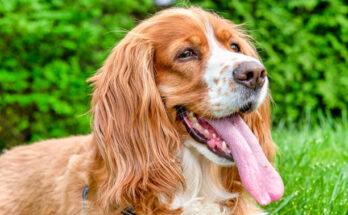The Skye Terrier brings uniqueness to the terrier family because of its magnificent coat and extended body alongside its powerful yet amicable personality. This complete publication provides in-depth research about every aspect of the Skye Terrier, including their origin story as well as physical features and training methods and grooming needs and health conditions, and lifestyle requirements.
Table of Contents
- Introduction to Skye Terriers
- History and Origin
- Physical Characteristics
- Personality and Temperament
- Training a Skye Terrier
- Exercise and Activity Needs
- Nutritional Requirements and Diet
- Grooming and Hygiene
- Common Health Issues and Preventive Care
- Socialization and Behavior
- Living Conditions and Adaptability
- Fun Activities and Games
- Conclusion
Introduction to Skye Terriers
The Skye Terrier exhibits a refined medium dog size while displaying magnificent flowing fur combined with dignified face expressions and strong loyalty traits. These terriers came from Scotland’s Isle of Skye where they initially existed to chase foxes and badgers in the region’s wild landscape yet beneath their elegant form they possess a strong nature. These dogs capture the attention of people through their dedicated personalities along with affectionate nature while retaining their mesmerizing good looks.
This rare terrier breed represents a valuable choice for people wanting a devoted friend who demonstrates both serene demeanour and brave character.
History and Origin
Roots in the Isle of Skye
The Skye Terrier’s origins trace back over 400 years to Scotland’s windswept Isle of Skye. As farm assistants these brave terriers first emerged for two purposes which included both pest management and helping farmers drive otters and foxes and badgers from their rocky ground.
Rise to Fame in Aristocracy
Queen Victoria caused Skye Terriers to gain vast popularity among British nobility during the 19th century because of her admiration for these dogs. Aribocrats embraced this breed as fashionable companions which frequently accompanied them through their lavish garden walks.
Fun Fact:
History remembers Greyfriars Bobby the Skye Terrier as a legendary Scottish dog because he remained by his owner’s grave for 14 years demonstrating boundless devotion.
Physical Characteristics
Size and Build
- Height: 9–10 inches (at the shoulder)
- Length: Approximately twice their height
- Weight: 25–40 pounds
- Build: Long, low, and muscular with substantial bone
The Skye Terrier stands out with its special body structure that harmoniously unites power elements with refined features.
Coat and Colors
Coat Texture and Length
The Skye Terrier sports a double coat:
- Outer Coat: Long, straight, and flowing; lies flat along the body
- Undercoat: Soft and woolly for insulation
Recognized Coat Colors
- Black
- Blue
- Gray
- Silver
- Cream
- Fawn
Skye Terriers often have darker ears, muzzle, and tail tips, adding richness to their appearance.
Personality and Temperament
What Are Skye Terriers Like?
The Skye Terrier demonstrates both proper dignity and steady composure together with assured self-assurance. Because of their strong personality and brilliant minds Skye terriers develop very close emotional ties with their owners. They protect themselves from unknown individuals while maintaining nonviolence except when they need to defend themselves.
Are Skye Terriers Good Family Dogs?
Yes! Due to their demands for loyalty and gentleness Skye Terriers work best as family pets when they receive proper treatment in this regard. These dogs form strong bonds that primarily focus on one or two people because of their excessive attachment habit.
Note:
Because Skye Terriers tend to be naturally reticent dogs they need structured socialization training from a young age to keep their temperament friendly and bold.
Are Skye Terriers Good Guard Dogs?
Absolutely. The natural defensive nature of Skye Terriers causes them to warn their owners about unfamiliar faces at home. Despite their small size Skye Terriers demonstrate strong courage which makes them outstanding watchdogs.
Training a Skye Terrier
Intelligence and Trainability
Due to their high intelligence Skye Terriers require long-term patient training since they have natural tendencies toward independence. Skye Terriers show their best behavior with owners who adopt a non-aggressive method of training instead of delivering punitive instructions.
Basic Training Tips:
Early onset training of obedience and socialization presents the best results.
Training success requires you to utilize rewards alongside verbal compliments and toys as positive feedback tools.
Maintain brief and interactive sessions to stop your dog from becoming uninterested.
Establish decisive and constant rules instantly when introducing them to the rules.
They demonstrate loyalty by wanting to please owners but resist owners who are either inconsistent or harsh in their approaches.
Exercise and Activity Needs
Daily Exercise Requirements
The Skye Terrier shows peaceful nature at home but needs regular physical activity to keep both its body and psyche in ideal condition.
Exercise Needs:
At least 45–60 minutes daily of combined physical activity and mental engagement.
Exercise Ideas:
- Leisurely walks
- Playtime in securely fenced yards
- Interactive games like hide-and-seek
- Low-impact agility courses suitable for their long backs
Mental Stimulation
The development and well-being of Skye Terriers depends on mental engagement because these dogs become animated when presented with puzzles and educational pursuits.
Mental Activity Ideas:
- Puzzle toys
- Advanced trick training
- Scent games and nose work
- Short obedience challenges
Nutritional Requirements and Diet
Recommended Diet
For health results Skye Terriers should consume protein-based meals with balanced fat content and minimal carbohydrate intake.
Ideal Foods:
- Lean meats (chicken, beef, lamb)
- Fish for healthy Omega-3s
- Sweet potatoes, carrots, and peas
- Blueberries, spinach, and pumpkin
Feeding Schedule
- Puppies: 3–4 small meals daily
- Adults: 2 evenly spaced meals per day
The dietary plan for adult Skye Terriers consists of two meals that should be distributed evenly throughout the day.
Closely watching Skye Terriers will help prevent obesity because excessive feeding can make them overweight.
Special Dietary Considerations
The veterinary advice can help determine whether supportive supplements glucosamine and chondroitin will benefit Skye Terriers since these dogs are prone to joint complications.
Grooming and Hygiene
Grooming Routine
The elegant outer coat of the Skye Terrier needs regular care to remain free of knots and maintain its good health.
Grooming Essentials:
- Brushing: 3–4 times a week to prevent matting
- Bathing: Every 4–6 weeks with a mild dog shampoo
- Professional Trimming: As needed to neaten the coat, particularly around the feet and ears
- Nail Trimming: Every 2–3 weeks
- Ear Cleaning: Weekly to prevent infection
- Teeth Brushing: 2–3 times a week
Coat Maintenance by Age
- Puppies: Frequent gentle brushing to accustom them to grooming
- Adults: Regular, structured grooming sessions to maintain coat quality
Common Health Issues and Preventive Care
Common Health Conditions
In general Skye Terriers enjoy good health but they possess several genetic diseases.
- Intervertebral Disc Disease (IVDD): Due to their long backs
- Hip Dysplasia: Malformation of the hip joint
- Eye Conditions: Such as progressive retinal atrophy
- Autoimmune Disorders: Occasionally found in the breed
Preventive Care:
- Regular veterinary checkups
- Annual vaccinations and parasite control
- Maintain a healthy weight to protect the spine and joints
- Early detection screening for hereditary issues
Socialization and Behavior
Tips for Socializing Your Skye Terrier:
- Enroll in puppy kindergarten classes
- Organize controlled playdates with well-behaved dogs
- Expose your Skye to various sounds, sights, and people from an early age
- Always reward calm and confident behavior
Common Behavioral Traits
- Loyal: Forms strong attachments to family
- Reserved: Shy with strangers without proper socialization
- Courageous: Will bravely defend loved ones
- Independent: Enjoys solo play and quiet moments
- Gentle: Particularly with family members and known friends
Living Conditions and Adaptability
Best Living Environments
When owners satisfy the exercise needs and social requirements the adaptable Skye Terrier adapts well to different environments.
Suitable Homes:
- Apartments with daily walks
- Suburban homes with secure yards
- Rural settings with plenty of supervised outdoor time
Climate Sensitivity
- Cold Weather: Skye Terriers generally tolerate cool weather well.
- Hot Weather: Caution is necessary; always offer shade and plenty of water to prevent overheating.
Short-legged Sky Terriers should never be permitted to jump from elevated positions because their long back may sustain injuries.
Fun Activities and Games
Physical and Mental Games
The Skye Terrier breed shows enthusiasm for games which stimulate their physical and mental capacities.
Game Ideas:
- Fetch (using soft balls)
- Tug-of-War (gently to protect their spine)
- Hide-and-Seek (with treats or toys)
- Low-impact Agility Courses
Enrichment Tools
- Food-dispensing toys
- Puzzle feeders
- Scent-tracking activities
- Rotating new toys to maintain interest
Keeping your Skye Terrier mentally challenged helps prevent boredom and encourages positive behaviors.
Conclusion
Through its life span the Skye Terrier provides faithful loyalty while delivering companionate bonds along with energetic personality traits. Intelligent courageous Skye Terriers prosper most in households that respond to their requirements of regular affection together with structure and physical engagement.
Key Takeaways:
Experienced dog owners should consider the Skye Terrier as their potential pet because they provide faithful affection through their loyal character.
Veritable happiness and health depend on frequent physical workouts as well as mental exercises for these particular breeds.
Owners who groom their thick coat make a dedicated effort which enhances both their appearance and comfort.
A dog needs early socialization to develop into a secure confident yet diverse adult companion.
Proper preventive healthcare allows Skye Terriers to live their lives to the fullest with extended high-quality periods.
A Skye Terrier adoption brings you a consistent loving friend who will enhance your family life through many joyous years with his refined spirit.




